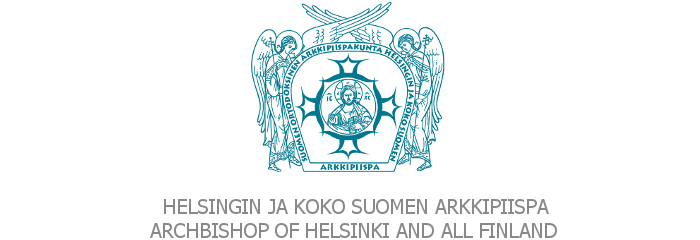Interview: Transforming mission into creating an Orthodox Commonwealth
Archbishop Leo, Answers to Journal “К единству!” of the International Foundation for the Unity of Orthodox Christian Nations, March 2010.
What kind of is the inter-religious balance in Finland?
“Finland does not have state churches and there is no obligatory registration for citizens to belong to religious organisations. All have equal rights to belong or not to belong to churches or religious communities (Mormon, Pentecostal, Jewish, Muslim etc.) of the country. The Orthodox Church in Finland has since 1918 the status of a second national church alongside with the Lutheran Church, and with the same rights to levy a church tax from its members.”
“The harmonious inter-religious balance of the country is maintained through western democratic ideals and values. All religious communities in Finland are invited to participle in ecumenical or inter-religious activities.”
What is the situation youth and the growth of parishes in Finland?
“Orthodoxy in Finland started in the 1970’s to open itself up to the world. The general stimulation in international relations and the disappearance of prejudices made the Orthodox Church of Finland an object of interest, so it began to attract young people. The Church membership figures began to rise again in the 1980’s, the growth being attributable to both Finnish people joining the church and Orthodox immigrants.“
“In the 1990’s the general globalization of society at large was one of the new challenges for the Church in Finland. Finland’s membership of the European Union from 1995 onwards meant another natural step towards cultural interaction. The altered world situation meant that Finland was receiving thousands of immigrants and refugees, to which the church responded in the first instance by developing its ability to conduct worship in other languages. Nowadays the churches in many cities hold services in English, Rumanian and Estonian as well as Finnish, Swedish, Church Slavonic and Greek.“
How the social activity of the Church is organized?
“The social activity of the Orthodox Church in Finland is conducted mainly by organisations. The Brotherhood of St. Sergius and Herman is focused on catechetical education and parish level diaconia. The official international mission agency for the Orthodox Church of Finland, Orthodox Mission, raises the awareness of mission in Finland and supports development programs in Africa and in Asia. Orthodox Church Aid from Finland, Ortaid, provides humanitarian aid via local Orthodox parishes and organizations and sets up joint international development and cultural programmes in collaboration with international organisations and local Orthodox communities. All organisations seek to promote in harmony of Gospel and Orthodox Tradition social welfare, equality, democracy and good governance.”
How do You see the Orthodox cooperation in modern world?
“We should be proud of our orthodox history. With icons, music and theology the orthodox tradition has influenced the European society as a whole. It was through early Byzantine Christianity that human equality first became a cornerstone of European social policy.”
“Today Orthodox churches should free themselves from nationality and transform their mission into creating an Orthodox Commonwealth. Globalization is a chance for the members of the undivided Orthodox Church. We should not be trapped in the double heritage and sacrifice Orthodox spirituality to the altar of national identity.”
“There is a general phenomenon that modern societies are growing from community based society to the society of individuals. Let’s not be afraid of this progress. Church can be at the same time a hierarcical establishement and a smooth network of small fruitful communities.”
“The Orthodox Church should take in all levels an active part in establishing ecumenical and cultural dialogue between all the parts of the world.”
What is the Unity of the Orthodox world?
“The unity of the Orthodox Church is based on the fact that every local community of the church bears the witness of the catholicity of whole Orthodox Church. In other words the orthodox communities in London, Luanda, Buenos Aires or Stockholm are not only parts of the patriarchates, but they form them. Does our church governance support this principle? The decisions concerning the life of Orthodox local communities belongs to the gathering of the faithful of that community.”
“The unity of the Orthodox Church is unity in faith, which is always unity in diversity. That is the only universal and historical cornstrone of Orthodox Unity!”




